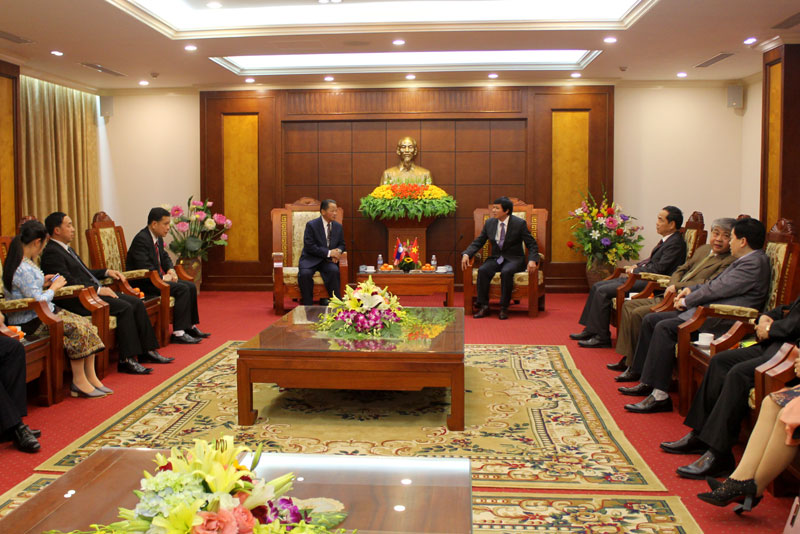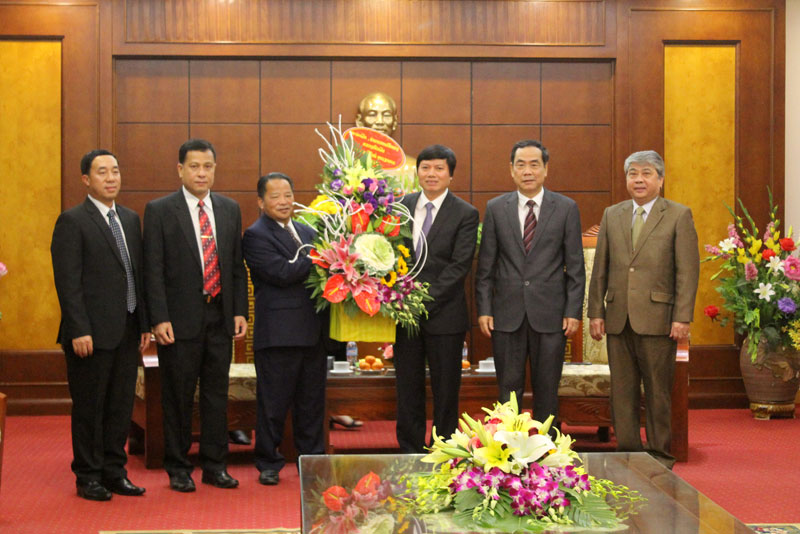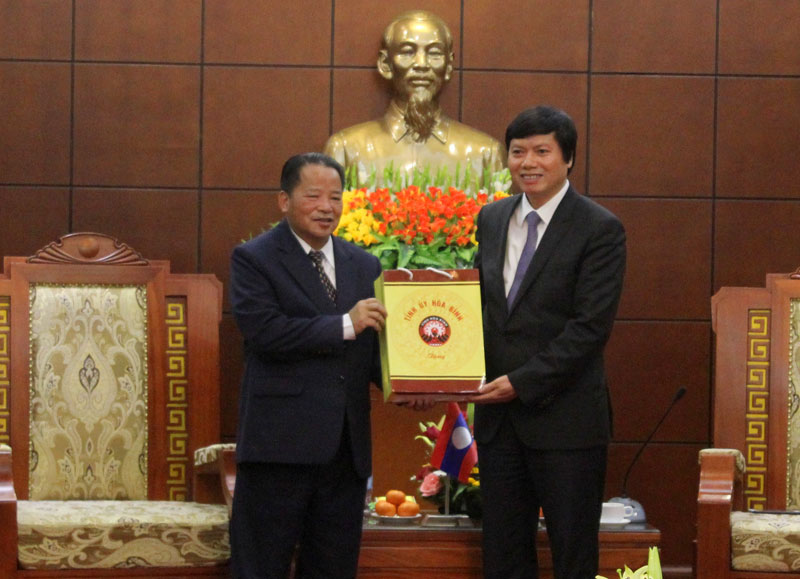
(HBO) – A delegation of the Lao province of Houaphanh led by Khamphiuvong Savan, Vice Secretary of the provincial committee of the Lao People’s Revolutionary Party and Chairman of the provincial committee of the Lao Front for National Construction, recently visited and extended Lunar New Year (Tet) greetings to Hoa Binh province.
Officials of Hoa Binh have a meeting with the delegation of Laos’s
Houaphanh province.
On behalf of Houaphanh leaders, Khamphiuvong Savan
presents flowers to congratulate Hoa Binh officials on the upcoming traditional
Tet festival.
Tran Dang Ninh, Vice Secretary of the Hoa Binh
provincial Communist Party of Vietnam Committee and Chairman of the provincial
People’s Council, presents a gift to the Houaphanh delegation.
Hoa Binh officials at the working session with
the Lao side include Vice Secretary of the provincial Communist Party of
Vietnam Committee and Chairman of the provincial People’s Council Tran Dang Ninh,
Vice Secretary of the provincial Party Committee and Chairman of the provincial
People’s Committee Nguyen Van Quang, Chairman of the provincial Vietnam
Fatherland Front Committee Hoang Thanh Mich, and Vice Chairman of the
provincial People’s Committee Nguyen Van Chuong.
Welcoming the Lao delegation, Vice Secretary of
the provincial Party Committee Tran Dang Ninh briefed them on the outcomes of
Hoa Binh’s implementation of political, economic, cultural and social tasks in
2017. He also reviewed the traditional friendship between Vietnam and Laos, as
well as between Houaphanh and Hoa Binh.
He congratulated the Lao province on its recent
major achievements, stressing that Hoa Binh will enhance comprehensive
cooperation with Houaphanh and other localities of Laos. It will push ahead
with exchange and mutual support activities, thereby helping to consolidate the
two countries’ special friendship.
Hoa Binh province will assist Houaphanh to build
a school and offer some other assistance activities, he added.
For his part, Khamphiuvong Savan highly valued
the strong changes and development in Hoa Binh over the past years. He asked
the two provinces to increase economic cooperation, cultural exchanges, and
information sharing while providing more practical mutual support.
On the threshold of Vietnam’s traditional Tet,
he wished Hoa Binh leaders and people health, happiness and success. He also
wished the Vietnam-Laos and Hoa Binh- Houaphanh special friendship and
comprehensive cooperation would be sustainable and develop more strongly.
During their stay, the Lao delegation also
visited the Hoa Binh hydropower plant./.
Hoa Binh province is undergoing a dynamic transformation amid Vietnam’s national digital transition. Building on Poliburo’s Resolution No. 57-NQ/TW on breakthroughs in science, technology, innovation, and national digital transformation, the province has rolled out a wide range of practical action plans. A standout initiative is the "Digital Literacy for All” movement, an effort to ensure that no one is left behind in the digital era.
Hoa Binh province is undergoing a dynamic transformation in the wake of the national digital transformation movement. Building on Resolution No. 57-NQ/TW of the Politburo on breakthroughs in science, technology, innovation, and national digital transformation, the province has implemented a wide range of practical action plans. A standout initiative is the "Digital Literacy for All” movement ambitious effort to ensure that no one is left behind in the digital age.
With a spirit of unity and proactive problem-solving, the Party Committee, the government and the people of Dong Lai Commune (Tan Lac District) have made great strides in implementing the resolutions of the 24th Party Congress of the commune for the 2020 - 2025 term. Focusing on leadership and practical actions, the commune has brought the Party’s resolutions into daily life, creating strong impacts and pushing the local development forward.
Amid the nationwide push for digital transformation, young people in Hoa Binh Province are stepping up as dynamic pioneers, applying technology to enhance Youth Union operations and expand the reach of youth-led initiatives. Through creativity and adaptability, Youth Union organizations at all levels have introduced a series of practical solutions, contributing to modern governance and community development.
In recent years, An Nghia commune, located in Lac Son district, has stepped up administrative reform, focusing on improving the quality and efficiency of its single-window service unit for receiving and processing administrative procedures. These improvements have helped create favourable conditions for local residents and organisations to handle administrative procedures, contributing to the commune’s broader socio-economic development.
The Prime Minister-approved master plan to develop the multi-use value of forests ecosystems through 2030, with a vision to 2050, aims to improve the management and sustainable use of forest resources, create jobs, increase incomes, and improve the living standards of ethnic minorities, people in mountainous and remote areas, forest workers and those living near forests.





